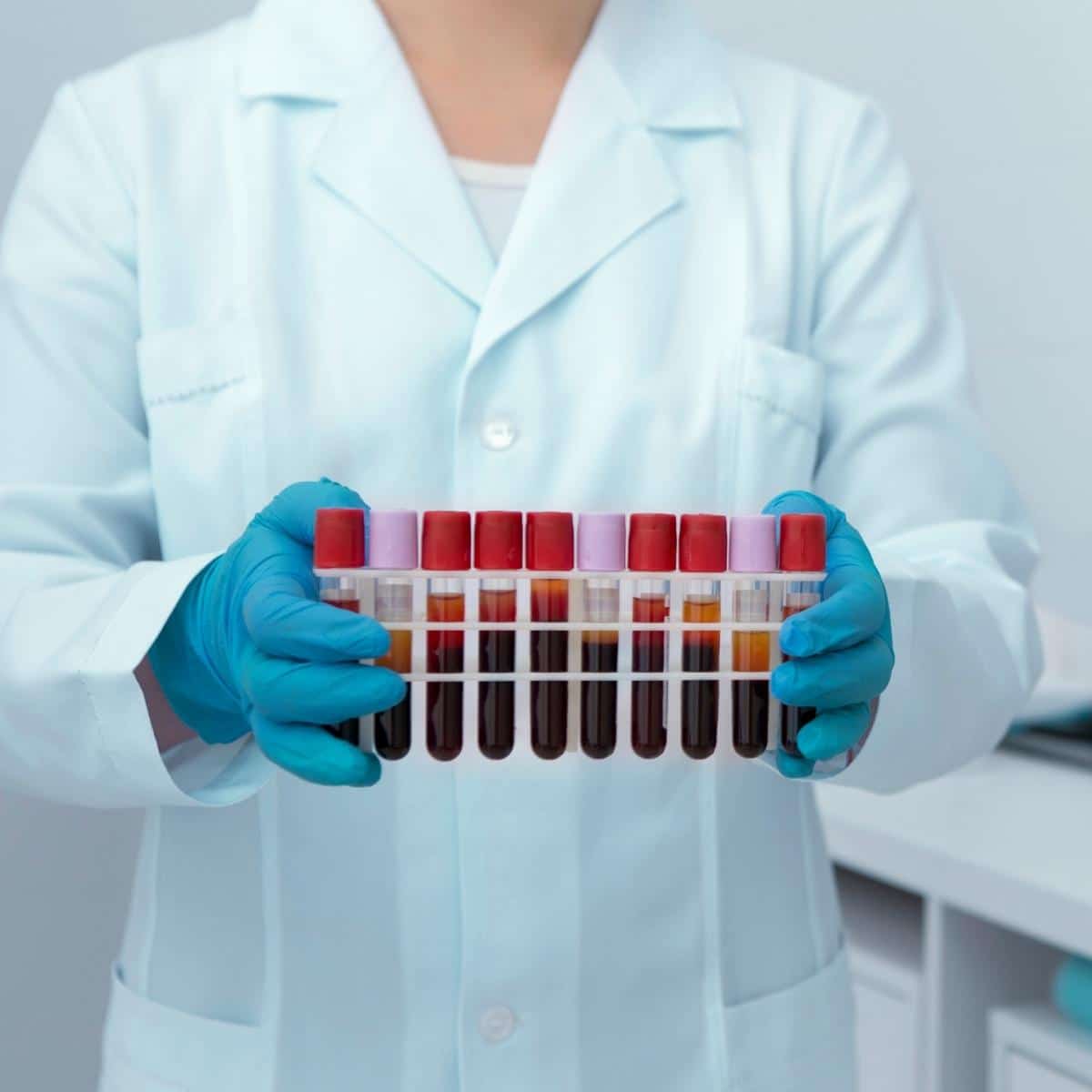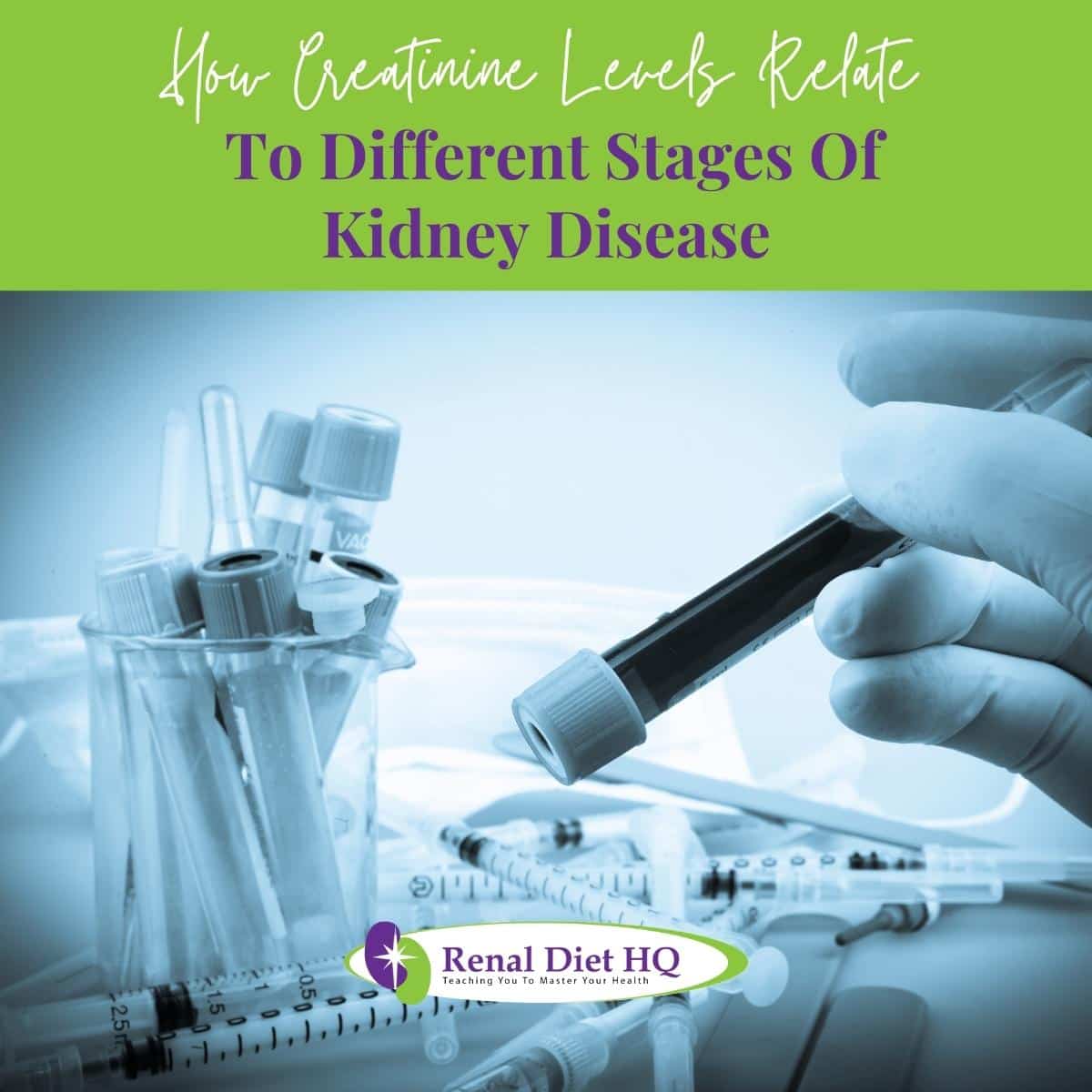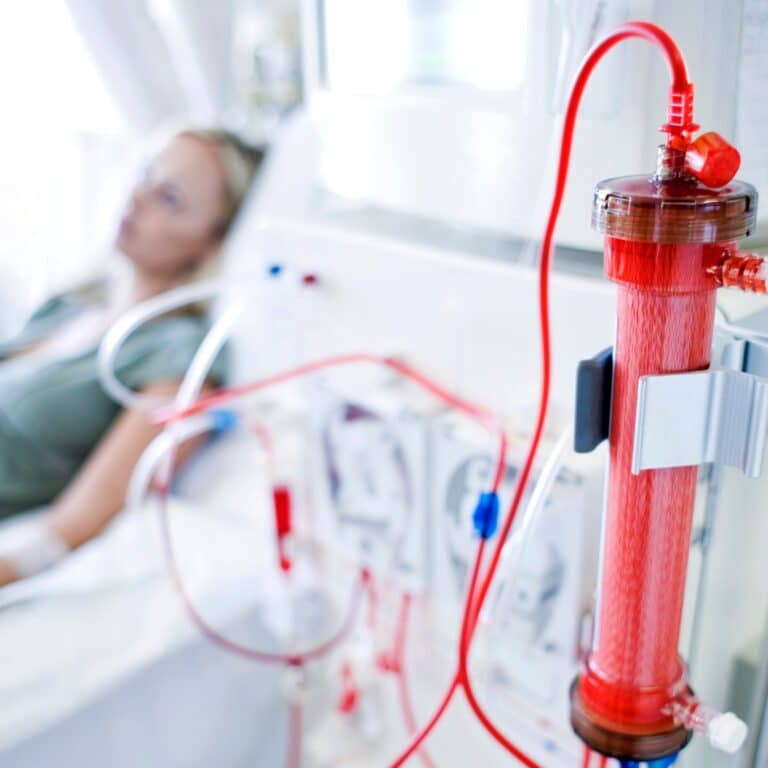Creatinine Lab Values For Kidney Disease
If you're in the medical field or caring for someone with kidney issues, understanding creatinine lab values is crucial. This biomarker plays a key role in diagnosing and monitoring kidney disease.
When your kidneys aren't working properly, creatinine levels can rise, indicating potential issues. It's an essential part of regular testing for Chronic Kidney Disease (CKD) and tracking its progression. However, factors like age, hydration, and muscle mass can influence these levels too.

But don't worry - we'll delve into all this complexity to help you understand it better. We'll also look at how lifestyle changes and diet can control high creatinine levels in kidney patients.
By the end of this article, you'll have a solid grasp on the importance of creatinine lab values for kidney health – knowledge that could make a significant difference for you or for those under your care.
Jump to:
- Key Takeaways
- Understanding the Role of Creatinine in Kidney Function
- The Importance of Regular Testing for Chronic Kidney Disease (CKD)
- How Creatinine Levels Indicate Kidney Health
- What is a Normal Range for Creatinine Levels?
- Factors Influencing Creatinine Levels: Age, Hydration, and Muscle Mass
- Monitoring Kidney Disease Progression Through Creatinine Levels
- How Creatinine Levels Relate to Different Stages of Kidney Disease
- Creatinine Levels and Renal Failure
- Lifestyle Changes to Manage High Creatinine Levels
- The Role of Diet in Controlling Creatinine Levels in CKD Patients
- Frequently Asked Questions
- Your Creatinine Levels Say A Lot About Your Kidney Health
Key Takeaways
- Creatinine Lab Values are important for monitoring kidney health in individuals with kidney disease or impaired kidney function.
- Tests for diagnosing kidney disease include GFR blood test and urine tests for albumin.
- Factors influencing creatinine levels include hydration, race, age, and muscle mass.
- Decreased GFR and increased creatinine levels over time indicate worsening kidney disease.
For More Recipes and Ideas --->> Get Your Free Meals and Recipes That Are Perfect for Pre-Dialysis Diets, Pre-Dialysis with Diabetes, or Dialysis Diets.
Understanding the Role of Creatinine in Kidney Function
You've probably heard about creatinine lab values and wonder how they tie into your kidney function - well, these levels are crucial as they can indicate the health of your kidneys and potentially signal any underlying kidney disease.
Creatinine is a waste product that's produced by your muscles during normal activity. Your kidneys, functioning as the body's natural filtration system, should efficiently remove this waste from your blood.
Your healthcare provider might recommend creatinine testing to assess renal function. This test measures the amount of creatinine in your blood or urine, helping to estimate how well your kidneys are working - a term referred to as 'creatinine clearance'.
If you have high creatinine levels in the blood, it could imply that there's some degree of kidney damage. This is because impaired kidneys fail to properly filter out and dispose of excess creatinine from the bloodstream.
However, don't panic! An isolated high reading doesn't necessarily mean you have chronic kidney disease. Other factors such as age, muscle mass, and hydration status also influence creatinine metabolism and hence its concentration in the blood. Regular monitoring over time provides a clearer picture of what's going on with your kidneys.

The Importance of Regular Testing for Chronic Kidney Disease (CKD)
Regular testing for Chronic Kidney Disease is of paramount importance for several reasons. CKD is often asymptomatic in its early stages, meaning individuals may not experience noticeable symptoms until the disease has significantly progressed.
Regular testing allows for early detection and intervention, enabling healthcare providers to implement measures to slow down or prevent further kidney damage.
Kidney function tests, such as serum creatinine and estimated glomerular filtration rate (eGFR), provide essential information about how well the kidneys are functioning. Monitoring changes in these markers over time helps track the progression of CKD and allows healthcare professionals to adjust treatment plans accordingly.
Furthermore, regular testing allows for the identification of risk factors and underlying conditions that can contribute to kidney disease, such as diabetes and high blood pressure. By addressing these factors early on, healthcare providers can better manage CKD and its associated complications.
Additionally, frequent testing helps in assessing the effectiveness of prescribed medications and dietary interventions. Adjusting medications and adhering to a renal-friendly diet are crucial for slowing disease progression and managing symptoms.
Regular testing also allows for timely detection of potential complications, such as electrolyte imbalances and anemia, which are common in advanced stages of CKD. Prompt intervention can prevent these complications from worsening and improve overall quality of life.
Overall, regular testing is essential for individuals with CKD as it enables early detection, effective management, and monitoring of kidney function and associated risk factors. Timely interventions based on test results can significantly impact disease progression and overall well-being for those living with CKD.
How Creatinine Levels Indicate Kidney Health
Creatinine levels are an essential indicator of kidney health and function. Creatinine is a waste product produced by the normal breakdown of creatine phosphate in muscles. It is filtered by the kidneys and excreted in the urine. The level of creatinine in the blood reflects the efficiency of kidney filtration and excretion processes.
When the kidneys are functioning normally, they efficiently clear creatinine from the bloodstream, maintaining a stable and relatively constant creatinine level within the normal range.
However, if the kidneys are impaired or damaged, their ability to filter and excrete creatinine is reduced. As a result, creatinine accumulates in the blood, leading to elevated levels.
High creatinine levels, therefore, are indicative of reduced kidney function or kidney disease. They suggest that the kidneys are not effectively filtering waste products from the blood and may be a sign of conditions such as chronic kidney disease (CKD), acute kidney injury (AKI), or other kidney disorders.
Monitoring creatinine levels over time is crucial in assessing kidney health and tracking the progression of kidney disease.
In addition to creatinine levels, other kidney function markers such as blood urea nitrogen (BUN) and estimated glomerular filtration rate (eGFR) are also considered to obtain a comprehensive picture of kidney health.
Regular monitoring of creatinine levels and kidney function tests can help identify kidney problems early, enabling timely intervention and management to prevent further deterioration and improve overall kidney health.
Maintaining a healthy lifestyle, including a balanced diet, adequate hydration, regular exercise, and avoiding nephrotoxic substances, can also play a crucial role in supporting kidney health and keeping creatinine levels within the normal range.
What is a Normal Range for Creatinine Levels?
Creatinine is a waste product generated from muscle metabolism and filtered by the kidneys for excretion.
The normal levels of creatinine can vary slightly between laboratories, but generally, for adult men, it is 0.6 to 1.2 mg/dL, and for adult women, with their typically lower muscle mass, it is 0.5 to 1.1 mg/dL.
Creatinine levels may increase gradually with age due to various individual factors. One significant factor is the age-related decline in muscle mass. As people age, they tend to experience a natural reduction in muscle mass, which leads to a decrease in creatinine clearance.
Since creatinine is produced by the body from muscle activity, less muscle mass results in lower creatinine excretion, causing the levels to rise in the bloodstream.
Moreover, as individuals age, decline in kidney function occurs, affecting their ability to filter and excrete creatinine efficiently. Reduced kidney function can lead to a gradual increase in creatinine levels, as the kidneys struggle to remove creatinine from the blood effectively.
It is important to note that while mild increases in creatinine with age are common and considered a normal part of the aging process, significant and rapid changes in blood creatinine levels should be evaluated by a healthcare professional.
Regular monitoring of creatinine levels, along with findings of other abnormal kidney function tests, can help detect any pathological changes and ensure timely intervention if necessary to maintain kidney health in older adults.
Factors Influencing Creatinine Levels: Age, Hydration, and Muscle Mass
Creatinine levels in the blood can be influenced by various factors, which are important to consider when interpreting test results and assessing kidney health.
- Kidney Function: The primary factor affecting serum creatinine levels is kidney function. Healthy kidneys efficiently filter and excrete creatinine, maintaining stable levels in the blood. When kidney function is impaired due to conditions like chronic kidney disease (CKD) or acute kidney injury (AKI), creatinine clearance decreases, leading to elevated blood levels.
- Age and Gender: Creatinine levels can vary with age and gender. Generally, men have higher creatinine levels than women due to their higher muscle mass. As people age, muscle mass tends to decrease, which can result in lower creatinine levels, especially in older individuals.
- Muscle Mass: As creatinine is a byproduct of muscle metabolism, individuals with more muscle mass tend to have higher creatinine levels. Athletes or individuals with greater muscle mass may show slightly elevated creatinine levels compared to those with lower muscle mass.
- Diet: Consuming large amounts of cooked meat can temporarily increase creatinine levels. This is because creatinine is a breakdown product of creatine, which is abundant in meat. However, this effect is usually temporary and not indicative of kidney dysfunction.
- Dehydration: Dehydration can cause a temporary rise in creatinine levels. When the body is dehydrated, blood flow to the kidneys decreases, affecting their filtration ability. Ensuring adequate hydration is essential for accurate creatinine measurements.
- Medications: Certain medications can affect creatinine levels. For example, some antibiotics and nonsteroidal anti-inflammatory drugs (NSAIDs) may cause a transient increase in creatinine.
- Underlying Health Conditions: Conditions that affect muscle breakdown, such as rhabdomyolysis, can result in significantly elevated creatinine levels.
Understanding these factors helps healthcare professionals interpret creatinine levels accurately and identify any potential kidney-related issues. Regular monitoring of creatinine levels, along with other kidney function markers, is vital in assessing kidney health and diagnosing kidney diseases early for better management and treatment outcomes.
Monitoring Kidney Disease Progression Through Creatinine Levels
Creatinine levels and estimated glomerular filtration rate (eGFR) are key indicators used to monitor the progression of Chronic Kidney Disease (CKD). Creatinine is a waste product generated by muscle metabolism and is filtered by the kidneys.
As kidney function declines, the ability to clear creatinine from the blood diminishes, resulting in elevated creatinine levels. eGFR, on the other hand, is a calculated value that estimates the kidneys' filtering capacity, reflecting the overall kidney function.
The correlation between creatinine levels and eGFR is inversely proportional. As kidney function declines, creatinine levels increase, indicating a decline in eGFR. When eGFR is low, the kidneys are less efficient at filtering waste products, leading to a build-up of creatinine in the blood. Conversely, when eGFR is higher, the kidneys are functioning better, resulting in lower creatinine levels.
Healthcare professionals use creatinine levels and eGFR together to assess the stage of CKD and monitor its progression. The staging of CKD is categorized based on eGFR values, and creatinine levels help confirm the severity of kidney dysfunction. As CKD advances, eGFR decreases, and creatinine levels rise, reflecting worsening kidney function.
Regular monitoring of creatinine levels and eGFR is crucial for managing CKD effectively. It helps healthcare providers make informed decisions about treatment plans, dietary adjustments, and medications to slow down disease progression and prevent complications. By closely tracking these markers, chronic kidney disease patients and their health care providers can work together to optimize care and improve the quality of life for individuals with CKD.

How Creatinine Levels Relate to Different Stages of Kidney Disease
Creatinine levels vary significantly throughout the stages of Chronic Kidney Disease (CKD), reflecting the progressive decline in kidney function. Creatinine is a waste product generated from muscle metabolism, and its elimination relies on the kidneys.
As kidney function declines, creatinine accumulates in the blood, resulting in increased levels. The stages of CKD are classified based on the estimated glomerular filtration rate (eGFR) and provide insights into the severity of kidney damage.
In the early stages of CKD (Stage 1 and 2), kidney damage is present, but the eGFR is relatively high (≥60 ml/min/1.73 m²). Creatinine levels may still fall within the normal range or show a slight increase.
As CKD progresses to Stage 3, eGFR drops to 30-59 ml/min/1.73 m². Creatinine levels start to rise significantly, indicating reduced kidney function and impaired filtration.
In Stage 4 CKD (eGFR 15-29 ml/min/1.73 m²), creatinine levels continue to increase, often exceeding the upper limit of the normal range.
Finally, in Stage 5 CKD or end-stage renal disease (ESRD), eGFR is less than 15 ml/min/1.73 m², and creatinine levels are markedly elevated, sometimes several times above the upper limit of the normal range.
It is important to note that creatinine levels alone do not provide a complete picture of kidney function, and other markers like blood urea nitrogen (BUN) and eGFR should also be considered. Regular monitoring of creatinine levels throughout the stages of CKD allows healthcare professionals to track disease progression, make appropriate treatment decisions, and optimize care for individuals with kidney disease.
Creatinine Levels and Renal Failure
For End-Stage Renal Disease (ESRD) patients on dialysis, monitoring creatinine levels remains essential despite the fact that dialysis itself clears creatinine from the bloodstream. Dialysis is a life-saving treatment for kidney failure that helps replace some kidney functions by filtering waste and excess fluids from the body.
However, dialysis does not completely restore kidney function, and levels of creatinine in blood can still provide valuable information about the patient's overall health.
In ESRD patients undergoing dialysis, creatinine levels typically decline after each dialysis session but gradually rise until the next session. Monitoring these levels helps assess the effectiveness of dialysis treatments and ensures that the prescribed dialysis regimen is adequately clearing waste products from the body.
Consistent monitoring also helps health professionals adjust the dialysis prescription if needed to optimize the patient's health outcomes.
Monitoring creatinine levels in dialysis ESRD patients also serves as an important tool in detecting potential issues or complications. Persistently elevated creatinine levels or abnormal trends may indicate inadequate dialysis or other underlying health problems that need to be addressed promptly.
Early detection of such issues allows for timely interventions, reducing the risk of further complications and improving overall patient outcomes.
Moreover, alongside other markers such as blood urea nitrogen (BUN) and potassium, creatinine levels contribute to assessing the adequacy of dialysis and the overall health status of ESRD patients. Regular monitoring empowers health care providers to provide personalized care, optimize dialysis treatments, and enhance the quality of life for dialysis-dependent ESRD patients.
Lifestyle Changes to Manage High Creatinine Levels
Adjusting your lifestyle can have a profound impact on managing elevated levels of certain waste products in your bloodstream, and it's worth exploring the various strategies that can help you achieve this. Lifestyle modifications are crucial in controlling high creatinine levels and maintaining kidney health.
To effectively manage your creatinine levels, consider these:
- Dietary changes: Limit intake of protein-rich foods and opt for more fruits, vegetables, and whole grains.
- Exercise Recommendations: Regular physical activity helps maintain healthy blood pressure and glucose levels.
- Hydration Strategies: Drinking sufficient water helps kidneys filter blood effectively. However, avoid overhydration as it may strain kidneys.
- Medication Management: Be careful with medications such as NSAIDs that can potentially harm your kidneys. Always consult with healthcare providers about safe choices.
- Limit Alcohol Consumption: Excessive alcohol impacts kidney function negatively causing high creatinine levels.
Remember to make these adjustments under professional guidance to ensure safety and effectiveness. By embracing these changes, you're not just targeting improved kidney function but also promoting overall wellness.
The Role of Diet in Controlling Creatinine Levels in CKD Patients
Diet plays a crucial role in controlling creatinine levels in people with kidney disease. Creatinine is a waste product of muscle metabolism, and its buildup in the bloodstream indicates impaired kidney function.
In CKD, the kidneys cannot efficiently filter creatinine, leading to elevated levels. By implementing a well-balanced and kidney-friendly diet, kidney patients can manage creatinine levels and slow down the progression of the disease.
A key dietary strategy is limiting protein intake. When the body metabolizes protein, it produces creatinine as a byproduct. Reducing protein consumption can help lower the production of creatinine, thereby easing the strain on the kidneys. However, it is essential to strike a balance between managing protein intake and meeting the body's nutritional needs.
Controlling sodium intake is equally important. High sodium levels can lead to fluid retention and increased blood pressure, adding stress to the kidneys. A low-sodium diet helps manage blood pressure and reduce fluid buildup, benefiting kidney health.
Moreover, monitoring phosphorus and potassium levels is vital. Imbalances of these minerals can be harmful to kidney health. A renal diet that restricts high-phosphorus and high-potassium foods can help preserve kidney function and minimize potential complications.
In addition to restrictions, a kidney-friendly diet should include fresh fruits, vegetables, and whole grains. These foods provide essential nutrients, antioxidants, and fiber, which can support overall health and kidney function.
Regular monitoring of creatinine levels, along with adherence to a kidney-friendly diet, is crucial in managing CKD and ensuring optimal kidney health. Consulting with a registered dietitian or healthcare professionals in your healthcare team to develop a personalized meal plan is recommended to meet specific nutritional needs while supporting kidney function effectively.
Frequently Asked Questions
Race can significantly impact creatinine levels due to race-based discrepancies, genetic influences, and dietary impacts on creatinine metabolism. For instance, people of African descent often have higher creatinine levels than their Caucasian counterparts.
This is due to differences in muscle mass and diet. Therefore, ethnicity-specific norms are applied when interpreting lab results. It's essential for healthcare providers to consider these factors when evaluating your kidney health.
Yes, lifestyle changes can help lower creatinine levels. Following a kidney-friendly diet with limited protein, controlled sodium, and balanced phosphorus and potassium is crucial for managing creatinine levels in chronic kidney disease patients.
Maintaining a healthy weight, staying hydrated, and avoiding medications that may harm the kidneys can also contribute to reducing creatinine levels. Regular exercise and managing underlying conditions like diabetes and hypertension play a vital role in supporting kidney health. Consult with healthcare professionals for personalized advice and monitoring.
Yes, short-term medication use can affect creatinine levels. Some medications, especially certain antibiotics, nonsteroidal anti-inflammatory drugs (NSAIDs), and contrast agents used in medical imaging, can cause a temporary increase in creatinine levels.
These drugs can potentially impair kidney function or alter creatinine production, leading to elevated levels. It's essential for healthcare providers to monitor creatinine levels during medication use and consider alternative medications if necessary, especially in individuals with pre-existing kidney conditions.
If your kidney health is worsening, it’s important to take positive action. In addition to medications that your doctor or healthcare provider may prescribe, there are many lifestyle changes that you can embrace to slow down and often prevent further kidney damage.
Your diet and nutrition do play a key role in the health of your kidneys and your doctor may put you on a renal diet. High blood sugar, high blood pressure, and some medications can also worsen kidney function so it’s important to get these under control.
Yes, creatinine levels can indicate other kidney conditions beyond CKD. Elevated levels may suggest issues like hypertension or diabetes - both risk factors that can impact your kidneys.
Regular creatinine testing is crucial to monitor these conditions. Your diet also plays a role; certain foods may affect creatinine levels. Strive for a balanced diet and regular check-ups to manage your health optimally, especially if you're dealing with these medical conditions.
Your Creatinine Levels Say A Lot About Your Kidney Health
Your kidney function test results (aka creatinine lab values) will be essential in determining if you have chronic kidney disease or loss of kidney function.
It’s important to keep in mind that if you have a family history of kidney disease or a kidney disease diagnosis that can impact the health of your kidneys like hypertension or diabetes, taking good care of your health right now can prevent kidney damage and your risk for kidney disease in the future.
If your lab results or your blood sample indicate kidney damage, changing your diet and lifestyle can go a long way toward preserving the health of your kidneys and decreasing risk factors. They’re two vital organs that your body can’t do without.
















My GFR has been steady at around 44 for the last year. Did go down to 17% because of anesthesia and lithium toxicity before rebounding to current level. Have adjusted diet and my nephrologist seems to think my kidney function is ok.
For a 57 year old man my kidney function should be at 93mL. Is this why I become fatigued so often?
Chloride, Bun and Creatinine are all still high. Hemoglobin is still low at 13.1. All have been out of therapeutic range since October 2021. all other blood work have rebounded but still these are off. Looking for any input. Like your renal diet and information about kidney disease. Thank you, Rich